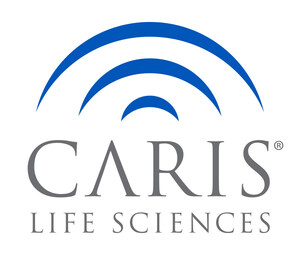Caris Life Sciences' Multiplatform Tumor Profiling Technology Identifies Expression of PD-1 and PD-L1 in Gynecologic Malignancies
Research Provides Potential Implications for Immunotherapy in Treatment of Gynecologic Cancers
IRVING, Texas, March 29, 2015 /PRNewswire/ -- Caris Life Sciences® today announced the presentation of important study data showing the presence of PD-1 and PD-L1 expressing cells in 1,599 gynecologic cancer samples. Using Caris Molecular Intelligence®, the company's panomic comprehensive tumor profiling service, researchers identified expression of programmed cell death protein-1 (PD-1) in all gynecologic cancers independent of histology while its ligand (PD-L1) expression was variable across malignancies and histologies. This data, along with two separate studies utilizing Caris Molecular Intelligence in the identification of druggable biomarkers in cervical cancers, were presented today during Poster Session B, at the Society of Gynecologic Oncology 2015 Annual Meeting on Women's Cancers in Chicago, Ill.
In the presentation led by Thomas Herzog, M.D., University of Cincinnati, titled "PD-1, PD-L1 expression in 1,599 gynecological malignancies – implications for immunotherapy" (abstract #509), researchers examined the presence PD-1 and PD-L1 in 1,599 cases of any gynecologic cancer. The results showed that PD-1/PD-L1 were most often co-expressed in endometrial stromal sarcomas and endometrioid endometrial cancer, while lower expression rates were detected in human papilloma virus (HPV)-associated cancers of the lower gynecologic tract.
"Caris Molecular Intelligence has one of the largest commercial databases and experience testing for PD-1 and PD-L1 expression, with more than 9,000 patients profiled to date," commented Sandeep K. Reddy, M.D., Chief Medical Officer at Caris Life Sciences. "These study results point to inhibition of PD-1 and PD-L1 as a potentially effective strategy in endometrioid endometrial cancer and supports the clinical utility of Caris Molecular Intelligence as a tool to help inform personalized treatment selection."
The overall PD-1 and PD-L1 expression rates were 67.9% and 19.6%, respectively, and the highest co-expression rates of PD-1 and PD-L1 were identified in sex-cord/stromal tumors and endometrial cancer. Ovarian sarcomas also had high co-expression. Lower rates were identified in HPV-associated cancers of the lower genital tract (e.g. cervical, vaginal and vulvar cancer). There were few statistically significant differences between histologic subtypes of endometrial and ovarian cancers. However, endometrioid endometrial carcinoma had a significantly higher rate of PD-1/PD-L1 expression compared with endometrioid ovarian carcinoma.
"Recent evidence has shown that PD-1/PD-L1-targeted immunotherapies improve outcomes in solid tumors and research suggests that we can identify patients who may benefit from immunotherapies using PD-L1 levels," noted Dr. Herzog. "While further research is needed, these results based on tumor profiling show that patients with these difficult cancers may benefit from targeted immunotherapy."
Cervical Cancer Tumor Profiling Offer Theranostic Biomarkers and Potential Pathways Toward More Personalized Treatment
In a second poster titled "Microarray analysis of vascular endothelial growth factor (VEGF)-dependent angiogenic biomarkers in squamous cell carcinoma (SCCA) and adenocarcinoma (AC) of the cervix" (abstract #3886), researchers analyzed 244 cervical cancer samples using Caris Molecular Intelligence based on recent data that demonstrated the efficacy of bevacizumab in patients with advanced cervical cancer. The study results, while retrospective, show that both SCCA and AC of the cervix display overexpression of biomarkers of the VEGF-dependent pathway of tumor angiogenesis, suggesting that bevacizumab is likely to inhibit angiogenesis in cases of SCCA or AC of the cervix and deserves further study.
A third poster titled "Paving the Road to Personalized Medicine in Cervical Cancer: Theranostic Biomarker Evaluation in a 592-Specimen Library" (abstract #3911), researchers used Caris Molecular Intelligence to profile a total of 592 cervical cancer cases to identify biomarkers that are known therapy targets. The majority of patients had metastatic disease (62%) and most were squamous cell carcinoma (51%) and adenocarcinoma (32%) of the cervix. Immunohistochemistry and gene amplification identified low ERCC1 (64%), low TUBB3 (74%) and high TOPO1 (51%) as targets for platinum-based therapies, taxanes, and topotecan, respectively. Mutational analysis revealed high mutation rates in PIK3CA, BRCA2, and KRAS, which suggest that targeted agents, including PIK3CA inhibitors, mTOR inhibitors, PARP inhibitors, and MEK inhibitors may be suitable for further research. This data highlights the utility of tumor profiling in women with cervical cancer in that theranostic biomarkers may help guide therapy in clinical trials of women whose cancer have progressed and have few treatment options.
About Caris Life Sciences® and Caris Molecular Intelligence®
Caris Life Sciences® is a leading biotechnology company focused on fulfilling the promise of precision medicine through quality and innovation. Caris Molecular Intelligence®, one of the industry's leading tumor profiling services with more than 70,000 patients profiled, provides oncologists with the most potentially clinically actionable treatment options available to personalize cancer care today. Using a variety of advanced profiling technologies to assess relevant biological changes in each patient's tumor, Caris Molecular Intelligence connects biomarker data generated from a tumor with biomarker-drug associations supported by evidence in the relevant clinical literature. The company is also developing Carisome® TOP™ technology, a revolutionary and proprietary blood-based profiling platform for diagnosis, prognosis, and theranosis of cancer and other complex diseases. Headquartered in Irving, Texas, Caris Life Sciences offers services throughout Europe, the U.S., Australia and other international markets. To learn more, please visit www.CarisLifeSciences.com.
SOURCE Caris Life Sciences
Related Links
http://www.carislifesciences.com
WANT YOUR COMPANY'S NEWS FEATURED ON PRNEWSWIRE.COM?
Newsrooms &
Influencers
Digital Media
Outlets
Journalists
Opted In





Share this article